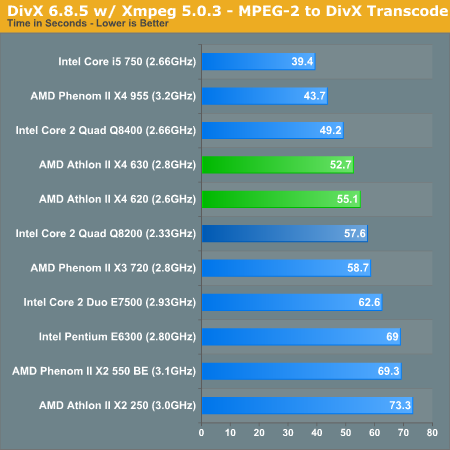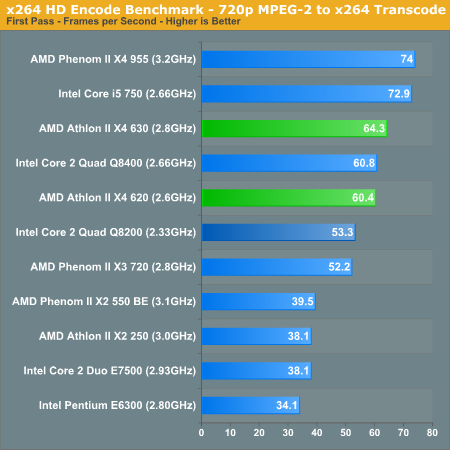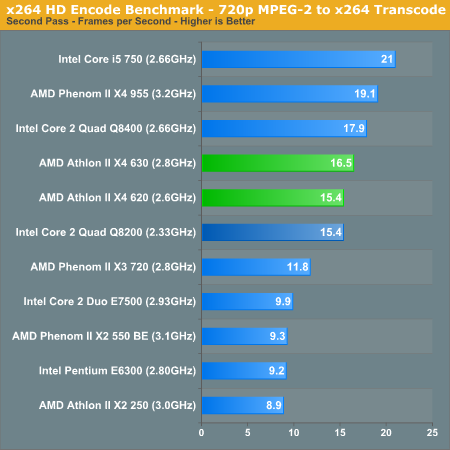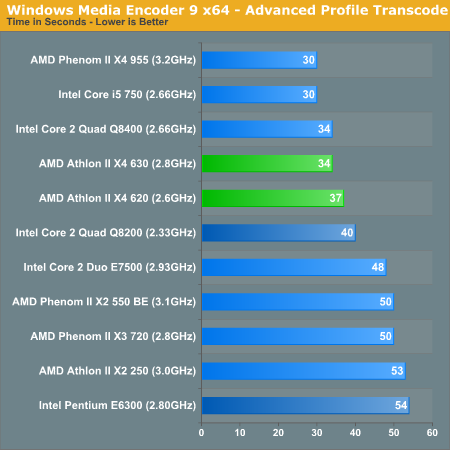AMD Athlon II X4 620 & 630: The First $99 Quad Core CPU
by Anand Lal Shimpi on September 16, 2009 12:00 AM EST- Posted in
- CPUs
DivX 8.5.3 with Xmpeg 5.0.3
Our DivX test is the same DivX / XMpeg 5.03 test we've run for the past few years now, the 1080p source file is encoded using the unconstrained DivX profile, quality/performance is set balanced at 5 and enhanced multithreading is enabled:

Four cores and you're good to go with video encoding. The Athlon II X4s are faster than the Q8200 and even the Phenom II X3 720. Intel doesn't have anything that offers better performance at $99 from a video encoding standpoint.
x264 HD Video Encoding Performance
Graysky's x264 HD test uses the publicly available x264 codec (open source implementation of H.264) to encode a 4Mbps 720p MPEG-2 source. The focus here is on quality rather than speed, thus the benchmark uses a 2-pass encode and reports the average frame rate in each pass.

The Athlon II X4 continues to beat up on more expensive chips. The Q8200 and the E7500 don't stand a chance. Only the Phenom II X4 and Core i5 are faster.

The Core 2 Quad Q8200 is only able to match the Athlon II X4 620 in performance here. While I'm used to writing that AMD needs to adjust prices downward, here the pressure falls on Intel.
Windows Media Encoder 9 x64 Advanced Profile
In order to be codec agnostic we've got a Windows Media Encoder benchmark looking at the same sort of thing we've been doing in the DivX and x264 tests, but using WME instead.

The Athlon II X4s round up our video encoding tests in the lead. At $99 you can't buy a better quad-core processor, or even dual-core for that matter if you're going to be encoding video.










150 Comments
View All Comments
thezorro - Wednesday, September 16, 2009 - link
remember that the lynnfield core i7 750 has turbo overclocking enabled so is overclocked to 3.2 ghz, which is 600 mhz overclocking, while amd processors are running at stock speedIs unfair to present the results this way, turbo is overclocking.
Wivvix - Thursday, September 17, 2009 - link
Sorry but your logic fails. It is a feature of the i7 750, that it runs at slower speeds when idle, as to when the processor is under load.In the same way, fan speed RPM is automatically regulated depending on whether the process is idle or under load.
The maximum clock speed of an i7 750 is 3.2gh. The user doesn't have to change or do anything. This is not overclocking in the sense you purport, and is not unfair. That is the maximum clock speed of the processor out of the box. End of story.
kagenokurei - Wednesday, September 16, 2009 - link
im sorry, but i have to defend thezorro at least this time..overclocking's basic principle is to increase CPU speeds..but if u guys look into it, what u increase is the core clock(GHz,MHz,etc) beyond the factory released specs..voltage increases and other tweaks are only done to make the overclock stable..
now,in this light,i also find it quite unfair to compare the single threaded performance of the i7s with the PII X4s..simply because the i7s can run its single core at a higher clock when the others are idle..therefore,overclocking at least THAT core..w/c of course, the PII X4s are unable to do..
i agree that the Turbo mode is a good feature, and AMD should have something like it on their CPUs..until then, the Turbo mode is kind of an unfair advantage in benchmarking single threaded performance..
jonup - Wednesday, September 16, 2009 - link
Well the PII 965 is an overclocked to 3.4GHz, which is 600MHz overclocking of 920. It's unfair to present the results this way. The 965BE is so obviously OCed because it uses tons more power than the 920.fitten - Wednesday, September 16, 2009 - link
Bzzzt... wrong... when will you fanbois give this up? It's the normal and default behavior of the thing. You can do the academic discussion all you want but normal operation of the chips has Turbo enabled. To test any other way is to test a non-standard, non-default operating mode. You might as well test with the caches disabled or one or more cores disabled since those are all non-standard, non-default operating modes as well.maxxcool - Wednesday, September 16, 2009 - link
++ ding!Archangel59 - Wednesday, September 16, 2009 - link
I can see both sides of this where Turbo could be considered altering the "normal" operation and also where turbo could be considered just the way it works.Doesnt bother me either way that this is put in the article, still good news from AMD.
However, since the turbo mode could be considered a supplied feature of the chip... couldnt the use of AMD Overdrive be considered a supplied feature of the newer chips? Even if it couldnt, I'd still love to see an article comparing the turbo mode to a well set up AMD Overdrive profile.
Lunyone - Wednesday, September 16, 2009 - link
So what your saying is that the test are fair because AMD doesn't have this "turbo" mode, so all of the benchmarks are created equal?? So if the benchmarks had set up the 955/965 to 3.2 gHz (with unlocked multiplier) than you would have a favorable review??Lunyone - Wednesday, September 16, 2009 - link
Crap! I meant to say "aren't fair" in a couple of lines in my response :(SlyNine - Wednesday, September 16, 2009 - link
Turbo mode is not overclocking. Overclocking is clocking OVER factor speeds.If the CPU can increase the speed as a factory set speed. THAT IS NOT OVERCLOCKING, so get over it.
On the other hand. Go AMD. I'm still awaiting the big Core I7 killer. comon AMD you can do it.